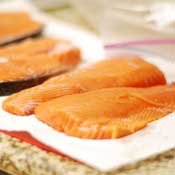Heart disease is the number-one killer in the U.S. You can reduce your risk of heart failure and coronary artery disease, which is the blockage of vessels that supply blood to the heart, by maintaining good cholesterol and blood pressure levels, and making healthy eating and exercising part of your lifestyle.
One of the most important factors of maintaining a healthy heart is choosing the right foods. Sweets, fried foods and saturated fats, also know as the "bad" fats, should not be a regular part of any diet. Instead, choose vegetables, fruits, grains and fish that are full of heart nutrients that promote a strong heart: B vitamins, omega-3 fatty acids, fiber, magnesium, potassium, calcium, folate and mono- and polyunsaturated "good" fats.
Fish such as salmon and tuna contain omega-3 fatty acids, linked to lowering the risk of heart disease, reports the American Heart Association. Omega-3 fatty acids can decrease the risk of abnormal heartbeats, slow the growth rate of plaque and slightly lower blood pressure.
Add flaxseeds, which contain unsaturated fat and fiber to cereal, muffins, cookies and even yogurt.
Use soymilk, which contains calcium, magnesium and isoflavones, or another heart-healthy food: oatmeal. Or substitute low-fat or fat-free milk for whole milk.
Eat black beans or kidney beans over brown rice for a healing and filling lunch or dinner. Nuts, such as walnuts and almonds, are great for their mono- and polyunsaturated fats, and they taste great in yogurt, salads, pastas, muffins and trail mix.
Bake or grill your foods, as the nutritional value can dramatically decrease or raise risks for diseases if you deep-fry. Limit butter, which has dietary cholesterol and saturated fat, and use good olive, canola and soybean oils for cooking or in salad dressings.
A good way to ensure that your heart is getting its necessary nutrients is to put as many different colors on your plate as possible. Blueberries, spinach, carrots, red bell peppers, oranges, tomatoes and broccoli are all rich in nutrients and color.
See http://www.heart.org/nutrition for more advice.



Comments
Use the comment form below to begin a discussion about this content.
comments powered by Disqus